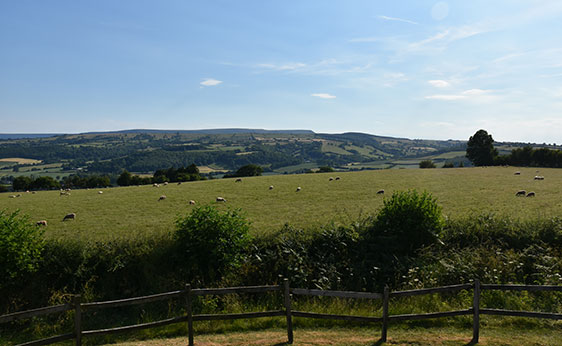Project Description
Overview
Since 2010, the Beneath Hay Bluff Project has been investigating the character of prehistoric, and specifically Neolithic activity in southwest Herefordshire, or the border between modern England and Wales. This region has been somewhat neglected by prehistoric archaeology, in part owing to a lack of antiquarian investigations, but it is increasingly clear that it is distinguished by a rich and under-exploited prehistoric record. In seeking to characterize Neolithic activity across a broader timescale and to address questions of monumentality, memory, place and material traditions, we have excavated at a number of sites, including the funerary round cairn at Olchon Court and the long mounds, buildings and causewayed enclosure of Dorstone Hill. The region is a rural one, with picturesque villages, castles, abbeys, rolling hills and lush river valleys: it is at once typically ‘English’ and bordering on rugged Welsh uplands. The field school provides a unique learning experience by drawing on the resources of both the University of Manchester and Herefordshire Archaeology. Many of our supervisory staff are professionals from the world of commercial archaeology, who bring a wealth of experience and know-how. As well as undertaking four weeks in the field, practicing excavation, recording and survey, students spend a week in the very different urban environment of Manchester, taking part in post-excavation tasks in the University laboratory, and visiting sites representative of the contrasting heritage of the world’s first industrial city. Having identified a site of national importance at Dorstone Hill, we will now seek to place this monumental complex into a wider context by addressing a series of new sites, and seeking to engage our local community to a greater extent. While completing work at Dorstone Hill, we will be expanding our scope to investigate a number of other sites. These will include the major megalithic tomb of Arthur’s Stone and the 11th century AD Snodhill Castle (near Dorstone).
| Course Details | |
|---|---|
| Course Dates | June 29-July 27, 2024 |
| Course Type | Field Archaeology, Prehistoric, Neolithic |
| Instructors | Prof. Julian Thomas & Prof. Keith Ray |
| Credits* | 8 semester (12 quarter) |
| Apply By | April 1 |
| Fees Due By | Summer 1 (May 1) |
| Program Fees | |
|---|---|
| Tuition | $3475 |
| Transcript Fee* | $300 |
| Health & Evacuation Insurance | $125 |
| Room & Board | $610 |
| TOTAL: | $4,510 |
Applications accepted on a rolling basis until program fills or final deadline above.
Instructors
The directors welcome emails and inquiries about the research elements of this project. More general information (tuition, health insurance, and payment schedule) can be found under the ‘Students’ tab above. Any further questions may be addressed to IFR staff. Additional details about research, course schedule, travel, accommodation, and safety can be found on the syllabus. Contacting the directors or the IFR office is encouraged and appreciated. It may help you determine if this field school is a good fit for you.
Testimonials
No student testimonials are available at this time.
Payment & Student Fees
Application Fee: There is a $45 fee to submit an online application.
Deposit Payment: A nonrefundable $500 deposit is due within 3 weeks of program acceptance in order to secure your place. The remainder of your program fees are due by the deadline indicated under “Course Details”.
*Transcript Fee & Academic Credit Opt Out: If you wish to participate in an IFR field school without earning academic credits, you will not be charged a transcript fee.
For more information about payment, fees, and policies, please see details under our Payment & Finances and Withdrawal and Cancellation Policy pages.
Accommodations
Our campsite is the cricket field in Dorstone village, which we have exclusive use of during the fieldwork period. There is a pavilion with showers and toilets, and another building used as a kitchen. During the fieldwork period we also have a large marquee for dining and social space, and at the bottom of the field, beside the stream, there is a space for a campfire. We will request students to each occupy a separate tent, and to pitch their tents at least two metres apart (for reasons of fire safety). Launderettes are found in Hereford and Hay-on-Wye, and washing can be collected and sent in for a service wash during the week. You can also hand-wash clothes at the campsite.
Individual tents and sleeping mats will be provided for all IFR participants, but you will need to bring a sleeping bag.
During fieldwork, our food is prepared by a cook employed by the project. There is a hot meal each evening, a variety of breakfast options, and a choice of sandwiches delivered to the site at lunchtime. We are happy to accommodate vegetarians, vegans, gluten-free, food allergies and intolerances, halal, kosher and other diets. One of the tasks of the day’s kitchen staff will be the rigorous cleaning of all food handling and preparation spaces.


Travel Info
Natural disasters, political changes, weather conditions and various other factors may force the cancellation or alteration of a field school. IFR recommends students only purchase airline tickets that are fully refundable and consider travel insurance in case a program or travel plans must change for any reason.
General information for this program is below, but keep in mind we will discuss any updated travel information and regulations during the required program orientation, which could affect travel plans.
We will be meeting all participating students at Manchester Airport, and conveying them from there directly to the field camp in Dorstone village by minibus, roughly a three-hour drive. You should time your flight to arrive before 2:00 pm local time on Saturday 29th June. If you wish to make other arrangements (for instance, arriving early in the UK), we can arrange to meet you at Hereford railway station.
If you missed your connection or your flight is delayed, please call, text or email the field school director immediately. A local emergency mobile phone number will be provided to all enrolled students.
Both excavation sites are very close to the campsite. While either could be walked in under half an hour, we will convey all personnel to site by minibus each day.
VISA REQUIREMENTS
To enter the United Kingdom, all U.S. citizens who do not also hold UK citizenship must present a valid U.S. passport to enter and depart. Your passport must be valid for the entire duration of your planned stay. U.S. and Canadian citizens can stay in the UK for up to 6 months, but check this frequently because regulations change, often with little notice.
Citizens of other countries are asked to check the embassy website page at their home country for specific visa requirements.
Student Safety
The IFR primary concern is with education. Traveling and conducting field research involve risk. Students interested in participating in IFR programs must weigh whether the potential risk is worth the value of education provided. While risk is inherent in everything we do, we do not take risk lightly. The IFR engages in intensive review of each field school location prior to approval. Once a program is accepted, the IFR reviews each program annually to make sure it complies with all our standards and policies, including student safety.
Students attending IFR international programs are covered by a comprehensive Health Insurance policy that includes physical illness or injury, mental or chronic conditions. No deductible and 100% of costs are covered up to $250,000. In addition, we provide Political and Natural Disaster Evacuation policy, which allow us to remove students from field school location if local conditions change. Our field school directors are scholars that know field school locations and cultures well and are plugged in into local communities and state institution structures.
Students attending IFR domestic programs (within the US) must have their own health insurance and provide proof upon enrollment. IFR field school directors are familiar with local authorities and if in need of evacuation, local emergency services and/or law enforcement will be notified and activated.
The IFR has strong, explicit and robust policy towards discrimination and harassment in the field. If students feel they cannot discuss personal safety issues with field school staff, the IFR operates an emergency hotline where students may contact IFR personnel directly.
Call us at 877-839-4374 or email us at info@ifrglobal.org if you have questions about the safety of any particular program.














